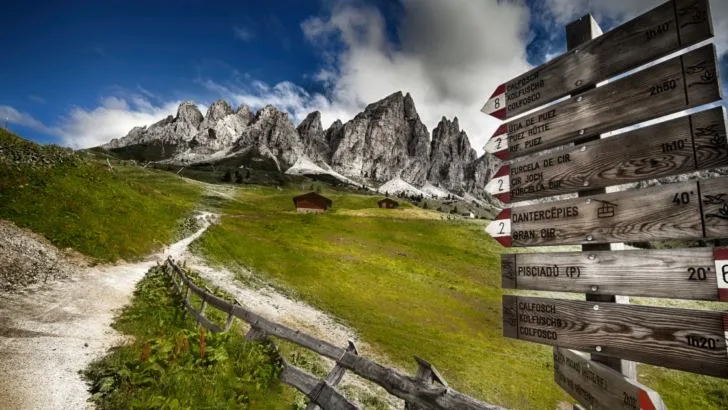When it comes to hiking, the length of the trail can be a major factor in determining the level of difficulty. But what exactly is considered a long hike? While there is no one-size-fits-all answer, there are some general guidelines to keep in mind.
According to various sources, hikes that are seven miles or longer in total length are generally considered to be a long hike. However, this length can vary depending on factors such as elevation gain, terrain, and personal fitness level. It’s important to keep in mind that what may be a long hike for one person may not be for another. In the end, it’s up to each individual hiker to determine their own limits and capabilities.
Key Takeaways
- A long hike is generally considered to be seven miles or longer, but this can vary depending on factors such as elevation gain and personal fitness level.
- It’s important for each individual hiker to determine their own limits and capabilities when it comes to long hikes.
- Factors such as weather conditions and hiking terrain can also impact the length of a hike.
What is Considered a Long Hike?
As someone who has spent a lot of time hiking, I can say that there is no one-size-fits-all answer to the question of what is considered a long hike. However, in general, a long hike is one that takes several hours to complete and covers a significant distance. The exact distance will depend on a variety of factors, including the terrain, elevation gain, and your own fitness level.
According to Mountain Treads, hikes that are seven miles or longer in total length are generally considered to be a long hike. However, this is just a rough guideline, and the actual length of a long hike will depend on a variety of factors. For example, a seven-mile hike with a lot of elevation gain can be much more challenging than a ten-mile hike that is mostly flat.
In addition to length, a hike’s difficulty is also influenced by starting elevation, terrain, and your own fitness and experience level. For example, a hike that starts at a high elevation can be more challenging than one that starts at a lower elevation, even if the total distance is the same. Similarly, a hike that involves a lot of scrambling or climbing can be more challenging than one that is mostly flat.

Overall, the best way to determine whether a hike is long or not is to consider the factors mentioned above and use your own judgment. If you are new to hiking, it’s a good idea to start with shorter, easier hikes and work your way up to longer, more challenging ones as you gain experience and confidence. Remember to always be prepared with proper gear, food, and water, and to leave no trace of your visit to the wilderness.
Factors that Determine Whether a Hike is Long
When deciding whether a hike is long or not, there are several factors that need to be taken into consideration. As an experienced hiker, I have found that the following factors play a significant role in determining whether a hike is long or not:
Distance
The distance of a hike is one of the most obvious factors that determine whether a hike is long or not. A hike can be considered long if it covers a significant distance, such as 10 miles or more. However, the distance alone does not necessarily make a hike long. Other factors, such as elevation gain and trail difficulty, can make a shorter hike feel longer.
Elevation Gain
The amount of elevation gain on a hike is another factor that can make a hike feel long. Hiking up steep inclines or mountains can be physically demanding and can take a lot of time. A hike with a significant elevation gain, such as 2,000 feet or more, can be considered long even if the distance is relatively short.
Trail Difficulty
The difficulty of a trail is another factor that can make a hike feel long. A hike with a lot of obstacles, such as boulders or fallen trees, can slow down the pace and make the hike feel longer. Similarly, a hike with a lot of switchbacks or steep inclines can be mentally and physically challenging and can make the hike feel longer.
Weather
The weather can also play a role in determining whether a hike is long or not. Hiking in extreme temperatures, such as during a heatwave or a cold snap, can be physically demanding and can make a hike feel longer. Similarly, hiking in rainy or windy conditions can slow down the pace and make the hike feel longer.

Time of Day
The time of day can also affect how long a hike feels. Hiking during the hottest part of the day can be physically demanding and can make the hike feel longer. Similarly, hiking in the dark can be mentally and physically challenging and can make the hike feel longer.
In conclusion, when determining whether a hike is long or not, it is important to take into consideration the distance, elevation gain, trail difficulty, weather, and time of day. These factors can all play a significant role in how long a hike feels and should be taken into account when planning a hike.
Tips for Planning a Long Hike
When planning a long hike, it’s important to take certain precautions to ensure a safe and enjoyable experience. Here are some tips to help you plan your next long hike:
Choose a Trail
When choosing a trail, consider the length, difficulty, and elevation gain. Make sure the trail is appropriate for your fitness level and experience. Research the trail beforehand, and check if there are any permits or fees required.
Start with Shorter Hikes
If you’re new to hiking or haven’t hiked in a while, start with shorter hikes to build up your endurance and test your gear. Gradually increase the distance and difficulty of your hikes as you become more comfortable.
Be Aware of the Trail Difficulty and Elevation Gain
Knowing the difficulty and elevation gain of the trail can help you prepare physically and mentally. Bring appropriate gear and clothing, and be prepared for the terrain.
Check the Weather Forecast and Dress Accordingly
Check the weather forecast before your hike and dress accordingly. Bring extra layers, rain gear, and sun protection. Avoid hiking during extreme weather conditions.
Bring Plenty of Food and Water
Bring enough food and water to sustain you throughout the hike. Hydration is especially important, so bring more water than you think you’ll need. Pack high-energy snacks and meals that are easy to carry and won’t spoil.

Let Someone Know Where You are Going
Before you set out on your hike, let someone know where you are going, when you plan to return, and how to contact you in case of an emergency. Consider bringing a GPS device or map and compass for navigation.
Carry the Proper Gear
Carry the proper gear for your hike, including a first aid kit, headlamp or flashlight, and a whistle. Bring a multitool or knife, and consider bringing a trekking pole for stability.
Be Prepared for Anything
Be prepared for unexpected situations, such as getting lost or encountering wildlife. Stay calm and think clearly. Remember to leave no trace and follow the principles of Leave No Trace Ethics.
By following these tips, you can ensure a safe and enjoyable long hike.
Importance of Being Mentally Prepared for a Long Hike
As someone who has hiked long distances before, I know that the physical aspect of hiking is only half the battle. Being mentally prepared is just as important as being physically fit.
Going on a long hike can be a daunting task, and it’s important to have the right mindset before embarking on the journey. Here are some reasons why being mentally prepared is crucial for a successful long hike:
1. Mental toughness helps overcome physical challenges
When hiking long distances, there will be times when your body feels tired, sore, and achy. It’s during these times that mental toughness comes into play. Being mentally prepared means that you have the ability to push through physical discomfort and keep going.
2. Mental preparation helps with decision-making
Hiking long distances requires making a lot of decisions, from when to take a break to which route to take. Being mentally prepared means that you are able to make sound decisions even when you’re tired or stressed.
3. Mental preparation helps manage expectations
It’s important to have realistic expectations when going on a long hike. Being mentally prepared means that you are aware of the challenges that lie ahead and have a plan in place to deal with them. This can help prevent disappointment or discouragement when things don’t go as planned.

In conclusion, being mentally prepared is just as important as being physically fit when it comes to hiking long distances. By having the right mindset, you can overcome physical challenges, make sound decisions, and manage your expectations.
Exercises That Can Help You Prepare Mentally for a Long Hike
As someone who has done a fair amount of long-distance hiking, I know that the physical preparation is only half the battle. Mental preparation is just as important, if not more so. Here are some exercises that can help you prepare mentally for a long hike:
Visualization
Visualization is a powerful tool that can help you mentally prepare for a long hike. Spend some time each day visualizing yourself hiking along the trail. Imagine the sights, sounds, and smells of the trail. Visualize yourself overcoming obstacles and reaching your destination. The more vividly you can imagine the experience, the better prepared you will be mentally.
Meditation
Meditation is another powerful tool for mental preparation. It can help you develop focus, concentration, and mindfulness, all of which are important for long-distance hiking. There are many different types of meditation, but a simple mindfulness meditation can be a good place to start. Simply sit in a quiet place and focus on your breath. When your mind wanders, gently bring it back to your breath.
Positive Self-Talk
Positive self-talk is an important part of mental preparation. Instead of focusing on negative thoughts and doubts, try to focus on positive thoughts and affirmations. Tell yourself that you are capable of hiking the trail, that you are strong and resilient, and that you will succeed. The more you can reinforce these positive thoughts, the more confident and prepared you will feel.

Goal Setting
Setting goals can help you stay motivated and focused during your hike. Break your hike down into smaller goals, such as reaching a certain milestone or completing a certain section of the trail. Celebrate each goal that you achieve, and use it as motivation to keep going.
Social Support
Finally, social support can be a powerful tool for mental preparation. Surround yourself with people who support and encourage you, and who share your passion for hiking. Join a hiking group or find a hiking partner who can help you stay motivated and accountable. The more social support you have, the more confident and prepared you will feel.
Activities That Can Help You Prepare Mentally for a Long Hike
Preparing mentally for a long hike is just as important as preparing physically. Here are some activities that can help you get in the right mindset for a long hike.
Practice Visualization
Visualization is a powerful technique that can help you prepare mentally for a long hike. Close your eyes and imagine yourself on the trail, taking in the beautiful scenery, feeling the sun on your face, and hearing the sounds of nature. Visualize yourself hiking strong and feeling confident. This can help you build mental resilience and prepare for any challenges that may arise on the trail.
Set Realistic Goals
Setting realistic goals can help you stay focused and motivated during your hike. Break your hike down into manageable segments and set goals for each segment. For example, you could aim to hike a certain number of miles each day or reach a specific landmark by a certain time. Celebrate each goal you achieve and use it as motivation to keep going.

Practice Mindfulness
Practicing mindfulness can help you stay present and focused during your hike. Take a few minutes each day to sit quietly and focus on your breath. Notice any thoughts or feelings that arise and let them go. This can help you build mental clarity and reduce stress and anxiety.
Build Mental Endurance
Long hikes can be physically and mentally challenging. To build mental endurance, try pushing yourself outside of your comfort zone in other areas of your life. For example, you could try a new hobby or take on a challenging project at work. This can help you develop the mental resilience you need to tackle a long hike.
By practicing visualization, setting realistic goals, practicing mindfulness, and building mental endurance, you can prepare yourself mentally for a long hike and enjoy the journey to the fullest.
What is considered a long hike – Conclusion
In conclusion, a long hike is generally considered to be a hike that is seven miles or longer in total length. However, the length of a hike can vary significantly depending on various factors, including the difficulty level, terrain, elevation gain, and personal fitness and experience level.
It is important to prepare adequately for a long hike to ensure a safe and enjoyable experience. This may include physical conditioning, proper gear, and knowledge of the trail and surrounding area.
Some key elements to help prepare for a long hike may include cardiovascular exercise, strength training, and practicing hiking on similar terrain. It is also important to bring enough water and food, as well as a first aid kit and other emergency supplies.
Remember to always follow Leave No Trace principles and respect the natural environment. With proper preparation and care, a long hike can be a rewarding and unforgettable experience.
Resources
- https://en.wikipedia.org/wiki/The_Wilderness_Society_(United_States)
- https://dribbble.com/shots/7170460-National-Geographic-Website-Redesign-Concept
- https://www.backpacker.com/
- https://americanhiking.org/
Frequently Asked Questions
What is a typical distance for a long hike?
A long hike can vary in distance, but generally, it is considered to be a hike that is seven miles or longer. However, this can vary depending on the individual’s fitness level and experience. Some long hikes can be over 20 miles and take several days to complete.
How many hours does a long hike usually take?
The duration of a long hike depends on various factors, such as the distance, terrain, elevation gain, and your own fitness level. On average, a long hike can take anywhere from four to eight hours, but it can take longer if the trail is more challenging or if you take frequent breaks.
What factors determine whether a hike is considered long?
The length of a hike is not the only factor that determines whether it is considered long. Other factors include the starting elevation, elevation gain, terrain, and your own fitness and experience level. A hike with a significant elevation gain, rugged terrain, and high altitude can be more challenging and require more time to complete.
What is the difference between a long hike and a short hike?
A short hike is typically a hike that is less than three miles and can be completed in under an hour. A long hike, on the other hand, is a hike that is challenging and requires more time and effort to complete. Long hikes can range from seven miles to over 20 miles and can take several hours to several days to complete.
What are some tips for preparing for a long hike?
Before going on a long hike, it is essential to prepare yourself physically and mentally. Some tips for preparing for a long hike include training your body by doing cardio and strength exercises, packing the right gear and supplies, familiarizing yourself with the trail, and staying hydrated and well-nourished during the hike.
What are the benefits of going on a long hike?
Going on a long hike can provide numerous benefits, such as improving your physical fitness, reducing stress and anxiety, boosting your mood, and connecting with nature. Long hikes also offer an opportunity to challenge yourself and push your limits, which can increase your confidence and self-esteem.
